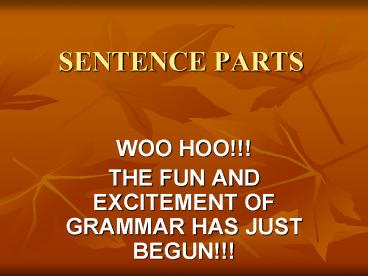SENTENCE PARTS - PowerPoint PPT Presentation
1 / 12
Title:
SENTENCE PARTS
Description:
Ex: The Great Wall of China was built in 214 B.C. Subject: Great Wall of China. Verb: was built ... Fragment is a group of words that has been capitalized ... – PowerPoint PPT presentation
Number of Views:61
Avg rating:3.0/5.0
Title: SENTENCE PARTS
1
SENTENCE PARTS
- WOO HOO!!!
- THE FUN AND EXCITEMENT OF GRAMMAR HAS JUST
BEGUN!!!
2
A SENTENCE
- A complete sentence is a word group that has
- A subject
- A verb
- Expresses a complete thought
- Ex The Great Wall of China was built in 214 B.C.
- Subject Great Wall of China
- Verb was built
- Complete thought? YES!
3
A SENTENCE FRAGMENT
- A Sentence Fragment is a group of words that has
been capitalized and punctuated as if it were a
complete sentence. - EX Commanded the Continental Army in the
Revolutionary War. - Subject NONE!
- Verb commanded
- Complete thought? NO! Who commanded the army?
4
A SENTENCE FRAGMENT
- EX On December 25, 1776, Washington his troops
across the icy Delaware River. - Subject Washington
- Verb NONE!
- Complete thought? NO! What did Washington do to
his troops? - Simply statedalways ask yourself if the group of
words makes sense!
5
YOUR TURN!
- First, complete worksheet pages 3 and 4.
- Second, use the following sentence fragments and
write 5 interesting COMPLETE sentences! - On the last day of summer
- Found only in the country
- A graceful ballerina
- The duck-billed platypus
- Singling loudly in the woods
6
SUBJECTS
- A subject tells whom or what the sentence is
about. - EX Aunt Louise found a beautiful antique lamp at
the garage sale. - Subject? Aunt Louiseshes the one who found the
lamp! - EX How surprised we were!
- Subject? Wewe were the ones surprised!
7
PREDICATES
- A predicate of a sentence tells something about
the subject - EX Marcos brother delivers pizzas.
- Predicate? Deliversthats what Marcos brother
does! - EX Under the large bush sat the tiny rabbit.
- Predicate? Satthats what the rabbit is doing!
- EX How talented you are!
- Predicate? Aream, is, are, was ,were, be, being,
been are all verbs!
8
YOUR TURN AGAIN!
- Add words to each of the following subjects and
verbs to make complete sentences. Underline the
subject once and the verb twice in your sentence.
- 1) Tent collapsed 2) Rabbits hop
- 3) Hours passed 4) Shirt was
- 5) Horses ran 6) Cars compete
- 7) Had neighbors gone 8) Africa contains
- 9) Pinatas will be fastened 10) is Japan
9
COMPOUND SUBJECTS
- A compound subject consists of two or more
connected subjects that have the same verb. - EX Pepper and Salty are our pet cats.
- Subjects? Pepper, Salty
- EX Children and nature are honored with their
own festivals in Japan. - Subjects? Children, nature
10
COMPOUND VERB
- A compound verb consists of two or more verbs
that have the same subject. - EX The dog barked and growled at the stranger.
- Verbs? Barked, growled
- EX The man was convicted but later was found
innocent of the crime. - Verbs? Was convicted, was found
11
YOUR TURN!
- Complete workbook pages 11 and 12.
- Combine the following pairs of sentences by
writing one sentence with either a compound
subject or a compound verb. - Maples grow well in this area. Birches grow well,
too. - Sabrina runs every other day. Sabrina swims every
other day. - The emu is a flightless bird. So is the kiwi.
- Maggie designed a knew kind of kite. Then she
built the kite.
12
PUTTING IT ALL TOGETHER!
- When you feel like you have mastered the art of
locating subjects and verbs complete workbook
pages 14 and 15. - Be sure to take your time and read through each
question AND the directions carefully! - Feel free to look back through your notes AND/OR
use your grammar book to help you! Look through
Chapter 10, pages 322-338! - Turn in all your completed work when you
- finished with the entire grammar packet!































